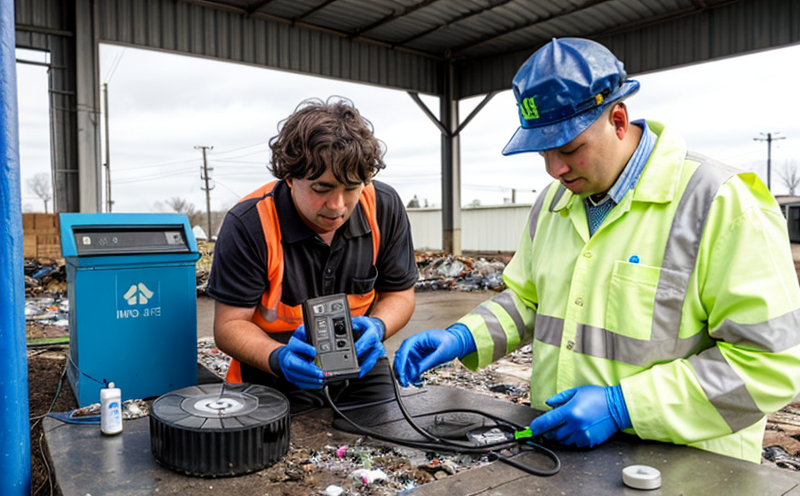DIN EN 16213 Cobalt Content in Waste Batteries
The DIN EN 16213 standard is a European directive aimed at ensuring the accurate determination of cobalt content in waste batteries. This service plays a crucial role in the waste management and recycling industry by providing precise quantification of cobalt, which is an essential element for the production of rechargeable batteries like lithium-ion cells.
Waste batteries are a significant source of cobalt, particularly from nickel-cadmium (NiCd) and nickel-metal-hydride (NiMH) batteries. The accurate measurement of cobalt content in waste batteries ensures compliance with environmental regulations and supports the circular economy by optimizing resource recovery processes. Compliance with this standard is mandatory for entities involved in recycling and processing waste batteries to ensure that they meet the stringent quality requirements set forth by regulatory bodies.
The testing process involves several steps, including sample preparation, digestion, and the use of instrumental analysis techniques such as Inductively Coupled Plasma Mass Spectrometry (ICP-MS) or Flame Atomic Absorption Spectroscopy (FAAS). The precision of these methods ensures reliable results that are essential for accurate quantification.
Our laboratory adheres strictly to the requirements outlined in DIN EN 16213, ensuring that all tests conducted meet international standards. By providing accurate and consistent data, we support our clients in making informed decisions regarding their waste management strategies and recycling processes.
The accuracy of cobalt content determination is critical for several reasons:
- Environmental Compliance: Ensures adherence to environmental regulations.
- Resource Recovery Optimization: Maximizes the recovery of valuable materials from waste batteries.
- Precise Resource Allocation: Allows for accurate resource allocation in recycling processes.
- Quality Assurance: Guarantees consistent quality in recycled products.
By offering this service, our laboratory supports the sustainable management of electronic waste and battery recycling. This not only contributes to environmental conservation but also fosters a more sustainable approach to resource utilization.
In summary, DIN EN 16213 Cobalt Content in Waste Batteries is an essential service for entities involved in waste management and recycling, particularly those dealing with batteries. It ensures compliance with international standards while providing accurate data that supports informed decision-making processes in the industry.
Benefits
- Compliance: Ensures adherence to environmental regulations and standards.
- Efficient Resource Recovery: Maximizes the recovery of valuable materials from waste batteries.
- Precise Data: Provides accurate cobalt content data that supports informed decision-making processes.
- Sustainability: Contributes to environmental conservation and sustainable resource utilization.
Customer Impact and Satisfaction
Our customers benefit significantly from the DIN EN 16213 Cobalt Content in Waste Batteries service. By providing accurate cobalt content data, we enable our clients to make informed decisions regarding their waste management strategies and recycling processes. This leads to improved compliance with environmental regulations and increased efficiency in resource recovery.
Our laboratory's commitment to precision and accuracy ensures that our customers can trust the results they receive from us. This builds long-term relationships based on reliability and expertise, enhancing customer satisfaction. Our clients appreciate the detailed reports we provide, which include comprehensive analysis of cobalt content in waste batteries, ensuring they have all the necessary information for their operations.
By offering this service, we not only support our customers' compliance efforts but also contribute to a more sustainable future by optimizing resource recovery and minimizing environmental impact. Our dedication to quality and precision has earned us a reputation as a trusted partner in waste management and recycling testing.
International Acceptance and Recognition
DIN EN 16213 Cobalt Content in Waste Batteries is widely recognized and accepted across Europe. This standard sets the benchmark for accurate cobalt content determination in waste batteries, ensuring that all tests conducted meet international standards. Our laboratory's adherence to this standard ensures that our clients receive results that are not only precise but also universally acceptable.
The acceptance of this service extends beyond Europe, as many countries have adopted similar standards or are considering aligning their regulations with these practices. This global recognition enhances the credibility and reliability of our services, making them attractive for international clients who require consistent quality across borders.
Our laboratory's expertise in this field has earned us a reputation as a leader in waste management and recycling testing. We pride ourselves on providing accurate, reliable, and internationally accepted results that contribute to environmental sustainability and regulatory compliance.





